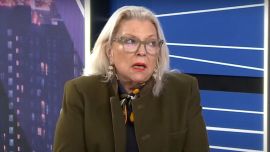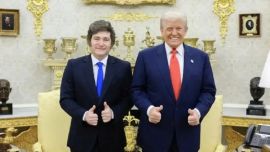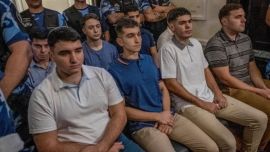Javier Milei was in the middle of his first television interview as Argentina’s president-elect when an adviser abruptly handed him a mobile phone. The cameras stopped rolling. Pope Francis was on the line.
The world’s two most powerful Argentines had traded barbs throughout the election that Milei won in a landslide last November. The foul-mouthed libertarian economist had referred to the pope as a “filthy leftist” and “the devil’s man on Earth,” accusing him of interfering in the politics of his deeply-Catholic home nation. The pope, for his part, used a pre-election television interview to warn against “saviours without a past” like Adolf Hitler, comments Milei took as a personal insult.
But the call, which Milei adviser Ramiro Marra recently recounted to Bloomberg News, was conciliatory and congratulatory, and kicked off a pivot that will culminate when they meet for the first time this week.
Milei sat in the front row of St Peter’s Basilica on Sunday as Francis canonised Argentina’s first female saint. Milei made the sign of the cross at the start of the ceremony. The president and the pope will hold a bilateral meeting at the Vatican a day later.
“That call marked a before and after,” said Santiago Olivera, Argentina’s military bishop, who will attend the mass alongside the president and emphasised the importance of the meeting between both heads of state. “In addition to being Argentine and being the Holy Father, he is a man the world looks at with great devotion.”
Milei’s visit to the Vatican, like the president himself, is unconventional — and even unexpected. The libertarian leader who rose to power thanks to rampant inflation embarked on an extended trip abroad in the midst of fraught legislative negotiations over his signature proposal to overhaul the crisis-stricken economy. Last week, congressional opposition sent the plan up in flames, forcing Milei to shelve it.
But the summit with the pope, whose status as the first Latin American pontiff lends him political weight especially amid his native nation’s poorest people, may also earn the president much-needed political capital at a crucial time. Milei faced a nationwide strike even before congress derailed his priority bill, and is now staring down projections of additional economic pain as a result of the “shock therapy” of austerity he has prescribed.
“This is an attempt to normalise very unintelligent international relations on behalf of the government,” said Juan Negri, the director of political science at Universidad Torcuato Di Tella in Buenos Aires. “The Church reaches the deepest levels of Argentine society, in a context of elevated social tension and a lot of poverty.”
Milei has made overtures to other targets of his campaign ire since winning the election, softening criticism of both China and Brazil — Argentina’s two largest trading partners. But the choice to visit Francis is a considerably larger shift, and another in which Milei’s religious faith is playing a central role in his approach to geopolitics.
It follows last week’s trip to Israel, where Milei pledged to relocate Argentina’s embassy to Jerusalem and danced alongside rabbis at the Wailing Wall. Milei is Catholic but says he intends to covert to Judaism, and has promised to strengthen ties with Israel even amid growing international criticism of its ongoing war in Gaza, especially from his Latin American neighbours.
“Milei’s pragmatism on the international stage is a lot more related to spirituality than realpolitik,” said Camila Perochena, a political analyst and television commentator. “He’s not going to Brazil or China.”
by Manuela Tobias, Bloomberg




















Comments